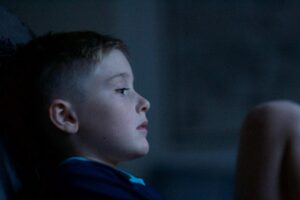Childline has revealed that, on average, over 1000 children reach out to them every month to discuss problems with anxiety.
 The confidential charity helpline delivered 12,543 counselling sessions relating to anxiety last year, making this the most common mental health concern that children and young people contact them about.
The confidential charity helpline delivered 12,543 counselling sessions relating to anxiety last year, making this the most common mental health concern that children and young people contact them about.
Counselling sessions centring on anxiety represent almost a quarter (23%) of all support provided by Childline for youth mental health issues.
Big issues are causing anxiety in children and young people
These sessions reveal that common causes for anxiety in children and young people include:
- Abuse and trauma
- Bullying
- Social and political issues
- Global concerns, such as climate change and conflict
- Body image issues
 These issues can make children and young people across the UK feel anxious, overwhelmed and panicked.
These issues can make children and young people across the UK feel anxious, overwhelmed and panicked.
The Director of Childline, Shaun Friel, says that thousands of children contact the charity helpline because of mental health concerns, particularly anxiety.
Speaking on World Mental Health Day earlier this month (10th October), he explained:
“We know how overwhelming these feelings can be, often leaving young people feeling trapped and unsure of where to turn.
“From the pressures of school and bullying to concerns about their appearance and worries about global issues, like climate change and world conflict, children are telling us they’re carrying an enormous emotional burden.”
Help is available for children with anxiety
The message to children and young people who are struggling with anxiety is clear: “it’s okay to not be okay, and that help is always available.”
Shaun Friel adds:
“Childline is here 24/7, providing a safe, confidential space where children can talk about their anxieties, no matter how big or small they may seem.”
The charity marked World Mental Health day by providing a series of tips and advice to help children and young people to manage feelings of anxiety:
- Practice deep breathing – Focusing on your breath can help to calm your mind and reduce feelings of anxiety. Try breathing in slowly through your nose for a count of five, and then exhale slowly through your mouth for another count of five.
- Engage in physical activity – Taking part in physical exercise can help improve your mood and manage anxious feelings. This can be as simple as going for a walk, having a dance around the kitchen or participating in sport. Ultimately, it’s important to find an activity you enjoy.
- Stay present – It can be helpful to use grounding techniques to keep you focused on the present moment and stop anxious thoughts from spiralling. It can be useful to try to identify things you can see, touch, hear, smell and taste
- Challenge negative thoughts – Childline advises that negative thoughts can contribute to anxiety. Try to pay attention to these thoughts and then reframe them, focusing on positive aspects or considering alternative perspectives.
- Reach out for support – Children and young people struggling with anxiety are reminded that they can contact Childline for free 24/7 for confidential advice and reassurance. They can also try confiding in a trusted adult, friend or counsellor for support and guidance.
Adults can offer valuable support for children with anxiety
 Parents, carers and other adults can be in a trusted position to help children and young people manage anxiety and support them to maintain positive mental health and wellbeing.
Parents, carers and other adults can be in a trusted position to help children and young people manage anxiety and support them to maintain positive mental health and wellbeing.
Childline provides 5 top tips for parents supporting children with anxiety:
- Communicate openly, encouraging children to talk about their feelings, and listen without judgment
- Understand the causes – identify specific situations or thoughts that trigger the child’s anxiety and work together to develop effective coping strategies
- Promote healthy routines for your child, including regular sleep patterns, balanced nutrition and physical activity, to provide a sense of stability and support physical and mental wellbeing
- Model positive coping mechanisms for managing stress, such as deep breathing, mindfulness or physical exercise
- Seek professional support when needed – if feelings of anxiety persist or get worse, consult with a healthcare professional or counsellor
Any adult with concerns about a child or young person can contact the NSPCC Helpline by calling 0808 800 5000, emailing them or submitting an online form.
The NSPCC provides more information and advice related to children’s mental health on their website.
Mental health training and guidance
 First Response Training (FRT) is a leading national training provider delivering courses in subjects such as health and safety, first aid, fire safety, manual handling, food safety, mental health, health and social care and more.
First Response Training (FRT) is a leading national training provider delivering courses in subjects such as health and safety, first aid, fire safety, manual handling, food safety, mental health, health and social care and more.
An accredited Mindful Employer themselves, FRT’s specialist mental health training courses include Understanding Mental Health, Mental Health Awareness in the Workplace, Managing Stress, Anxiety and Phobias Awareness, Self-Harm Awareness and Suicide Awareness.
They can also provide qualified, approved trainers to deliver accredited Mental Health First Aid (MHFA) training courses, including the Adult, Youth and Lite versions.
A trainer from FRT says:
“Most people feel anxious at some point in their life, and so it is probably one of the mental health problems that people are most able to relate to. It affects a great many people, including increasing numbers of children, especially post-pandemic.
“It’s really important that we all have an understanding of mental health problems and an awareness of common conditions such as anxiety, and that we are familiar with effective support strategies for helping others and managing our own anxiety and safeguarding our wellbeing. It’s also important for anyone who works with children and young people to understand how to support them with anxiety and help them to look after their mental health and wellbeing.
“Our Anxiety Awareness training provides learners with an understanding of a range of specific anxiety disorders, how they can be managed and treated, and how to offer support to someone dealing with anxiety.”
Helpful resources
A brief summary of our mental health training can now be downloaded as an infographic.
We also have a number of free infographics available to download which provide simple tips for helping to manage your anxiety and panic attacks. These include:
You can download our free Guide to Mental Health Training from our website.
You can also download FRT’s free Guide To Supporting Young Minds.
For more information on the training that FRT can provide, please call them today on freephone 0800 310 2300 or send an e-mail to info@firstresponsetraining.com.
